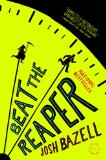Summary | Excerpt | Reading Guide | Reviews | Beyond the Book | Read-Alikes | Genres & Themes | Author Bio

A Novel
by Josh BazellThis article relates to Beat the Reaper
The United Partisan Organization
In Beat the Reaper the fictional Peter Brown/Pietro Brnwa recounts the story of how
his grandparents met in the winter of 1943 when they joined the Jewish
resistance movement in Poland, hiding out in the Bialowieza Forest. According to
Brnwa family legend the young couple (they were both fifteen at the time) were
duped into going back to Krakow in order to save her brother from the Nazis. It
was a ruse and they were sold into Auschwitz. They survived because both were
sent to work in the manufacturing part of the famed death camp. In one of the
more poignant passages of the book Brown tells about when, as an adult, he made
a trip to Poland to seek out the man who had betrayed his grandparents and,
while there, he visited Auschwitz.
 Although he doesn't say one way or the other, the group in the Bialowieza
Forest might have been part of a larger resistance organization that was founded
in the ghettos of Vilna (now Vilnius, Lithuania) by a young, charismatic Jew
named Abba Kovner. Called United Partisan Organization-Fareinikte Partisaner
Organizatzie - F.P.O. - it was formed in early 1942 and its motto, taken from a
speech made by Kovner, was, "We will not go like sheep to the slaughter."
Although he doesn't say one way or the other, the group in the Bialowieza
Forest might have been part of a larger resistance organization that was founded
in the ghettos of Vilna (now Vilnius, Lithuania) by a young, charismatic Jew
named Abba Kovner. Called United Partisan Organization-Fareinikte Partisaner
Organizatzie - F.P.O. - it was formed in early 1942 and its motto, taken from a
speech made by Kovner, was, "We will not go like sheep to the slaughter."
According to the
Holocaust Research Project,
"One of [FPO's] key goals was to establish ties to the Soviet resistance in the
city and the forests. Kovner also sent emissaries to the Warsaw and Bialystok
ghettos to warn the inhabitants about the mass killings of Jews in the occupied
Soviet Union and to incite resistance."
While tens of thousands of ghetto Jews were being rounded up and
summarily murdered by German troops, Kovner's resistance fighters did their best
by sabotaging German military trains and equipment transports. They helped
hundreds escape "through the city's sewers and other outlets to the Rudniky
forests where they joined Soviet partisans in many combat missions. There Kovner
and his followers operated a partisan division comprised solely of Jews, and
performed many heroic acts of sabotage."
 While the F.P.O. achieved their aim of not going like sheep to the slaughter, they were unable to defeat their Nazi tormentors; but there is
information about a lesser known post-war group supposedly called Nokmim (Hebrew for avengers)
that attempted, and in many cases succeeded, to retaliate for the millions of
Jewish deaths. While many believe at least part of Nokmim's membership comprised
former members of the British military's Jewish Brigade, there is some
speculation that Kovner was instrumental in this group as well. It is an
interesting story that highlights the conflict between justice and Old Testament
eye-for-an-eye revenge. Regardless, it is fact that several hundred – of the
purported several million – Germans who participated in the deaths were dealt
with either en masse (in 1946 nineteen hundred Nazi prisoners of war were
poisoned by arsenic in their bread) or were hunted down and then simply
disappeared or "committed suicide." The Jewish Brigade's activities
spanned the globe for decades after the war ended.
While the F.P.O. achieved their aim of not going like sheep to the slaughter, they were unable to defeat their Nazi tormentors; but there is
information about a lesser known post-war group supposedly called Nokmim (Hebrew for avengers)
that attempted, and in many cases succeeded, to retaliate for the millions of
Jewish deaths. While many believe at least part of Nokmim's membership comprised
former members of the British military's Jewish Brigade, there is some
speculation that Kovner was instrumental in this group as well. It is an
interesting story that highlights the conflict between justice and Old Testament
eye-for-an-eye revenge. Regardless, it is fact that several hundred – of the
purported several million – Germans who participated in the deaths were dealt
with either en masse (in 1946 nineteen hundred Nazi prisoners of war were
poisoned by arsenic in their bread) or were hunted down and then simply
disappeared or "committed suicide." The Jewish Brigade's activities
spanned the globe for decades after the war ended.
The Bielski Brothers
A group similar to FPO was led by the Bielski Brothers in the forests of
Belarus. Their story is told in Peter Duffy's 2003 book
The Bielski Brothers and in the movie
Defiance,
released in January 2009.
Images: Undated photos of Abba Kovner (1918-1987) from holocaustresearchproject.org
![]() This "beyond the book article" relates to Beat the Reaper. It originally ran in February 2009 and has been updated for the
September 2009 paperback edition.
Go to magazine.
This "beyond the book article" relates to Beat the Reaper. It originally ran in February 2009 and has been updated for the
September 2009 paperback edition.
Go to magazine.
Your guide toexceptional books
BookBrowse seeks out and recommends the best in contemporary fiction and nonfiction—books that not only engage and entertain but also deepen our understanding of ourselves and the world around us.